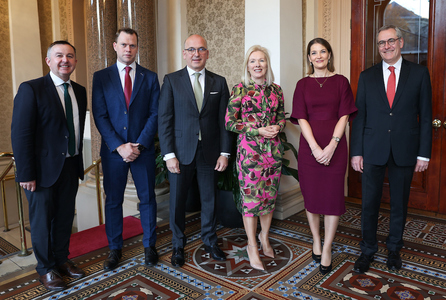With persistent macro-economic uncertainty, tightening monetary policy and the legacy threat of contagion from the challenges that faced some parts of the global banking sector earlier this year, discussions focused on the potential for international banks based in Ireland, to address the fallout and evolving regulatory landscape as we look to the future with a sustainable growth mindset. A number of key themes emerged on the day:
The Irish international financial services (IFS) story is one of tremendous success but the measures that contributed to that outcome need to be sustained in order to ensure this continues into the future.
FIBI banks have substantially increased their workforce in Ireland with additional capabilities being established in the country across not only front-line client functions but also in technology, operations, and cyber security. Earnings in the industry are improving following the normalisation of interest rates and asset quality remains strong.

Brian Hayes, Chief Executive, Banking & Payments Federation Ireland (BPFI); Gavin Purtill, Director of Regulation & Supervision, BPFI; Fernando Vicario, FIBI Chair & CEO, Bank of America Europe DAC; Fiona Gallagher, CEO, Wells Fargo Bank International; Davinia Conlan, Citi Country Officer, Ireland; and Dominique Laboureix, Chair of the Single Resolution Board.
That said, there are a number of items on the upgraded industry “watchlist” for the coming year. Inflationary pressures appear to have peaked but have not ended. Interest rate pressures seem to have eased off but further hikes by the ECB can’t be ruled out. Geopolitical risks have unfortunately increased with the conflict in the Middle East and the continuing war in Ukraine. Ireland, like much of Europe, continues to face housing and cost of living challenges along with the constant battle to attract and retain talent. The global banking industry remains very highly regulated and there is the additional effort in Ireland to prepare for the “Individual Accountability Framework” which brings increased regulatory obligations. Financial reporting requirements, especially around climate risk, will also absorb significant resources.
Ireland is a great place to do business but to maintain the growth momentum, the industry has four main requirements. Firstly, a positive operating environment is needed where enterprise can continue to develop and thrive. Secondly, it needs a predictable and stable fiscal and legislative environment to maintain Ireland’s attractiveness as a place in which to operate. Thirdly, the continued drive towards a level regulatory playing field with the rest of the EU is essential in order to continue to attract new international market entrants as the financial market continues to evolve and financial institutions make their decisions on where the various components of their business are located. Finally, Ireland needs to ensure that it takes the necessary steps to take advantage of the opportunities that lie in the evolving IFS world and the changing distribution of financial services activities across Europe. In particular, there is an enormous opportunity for Ireland to position itself as an important hub in the rapidly growing world of sustainable finance.
In an active year for banking resolutions, the SRB consider that the measures put in place after the financial crisis to deal with these events largely worked but will require further refinement.
FIBI recognises that 2023 was a significant year for banking resolutions with exercises on Silicon Valley Bank (SVB) in the US and Credit Suisse. The SRB view was that the overall resolution framework remains valid and needs only limited evolution rather than profound changes. In addition, the SRB sees that transfer tools such as the sale of business tool should be considered in conjunction with bail-in in some cases. The SRB expressed their view that resolution authorities need to plan to have flexibility in the choice of which resolution tool to use depending on the circumstances.
The risk of even one non-coordinated comment was highlighted as having far reaching and unintended consequences. During the Swiss crisis, the SRB, ECB, and European Banking Association (EBA) issued a joint statement on the differences between the EU and Swiss instruments which calmed the markets and helped normalise funding costs for EU banks.
On the matter of liquidity, the SRB resolution toolkit is strong but not complete. This could be achieved by a more powerful public backstop to restore public confidence post resolution, especially for larger banks. Promoting financial stability in cooperation with supervisory authorities is critical because if trust is hard won, it is also easily lost.
There are a number of new EU developments on the horizon that will impact on bank resolution exercises, among them the crisis management deposit insurance initiative (CMDI). The updated proposals in this area announced in April of this year are not perfect but do constitute a step in the right direction. The SRB (and the ECB) believes in the use of the Deposit Guarantee Scheme (DGS) in the resolution process and supports the removal of the DGS super priority status. Further, the SRB has the view that CMDI will enhance the crisis management tool set, particularly to enact sales as part of the resolution process.
One of the proposed powers provided by CMDI is its empowerment of the relevant supervisor to withdraw a banking licence in the event of the initiation of insolvency proceedings, when the failing or likely to fail (FOLTF) is declared. Until the CMDI process is finalised, the SRB needs to work on resolvability under the current framework.

The annual FIBI Conference took place on 21st November, 2023 in the College Green Hotel, attended by more than 150 business leaders. The conference theme was 'Future Focused Sustainable Strategies'.
The current framework has allowed the SRB, along with the banks, to greatly enhance the resolution landscape, meaning that banks are more resolvable and so safer than before, to the benefit of taxpayers, shareholders and for the overall financial stability of the system. The SRB published its annual resolvability assessment and heat map report in September. The report shows that most banks are making good progress towards resolvability and the SRB believes that the vast majority of banks will soon reach their final MREL (minimum requirements for own funds and eligible liabilities) targets. It was noted that the Single Resolution Fund is on track to reach the target of 1% of covered deposits. The industry feedback to the strategic review of the SRB operations was welcomed and this exercise will lead to it becoming more efficient and effective in its work.
The ECB expects banks to treat ESG risks in the same manner as all other significant risk categories and will supervise and assess this treatment with their existing suite of review and enforcement tools.
FIBI recognises that climate change, and the efforts to contain it by transitioning to a carbon neutral economy, will change the world we live in and banks in an unprecedented way. While managing climate risks is significant for financial institutions, the existing risk management frameworks and models developed over time can readily be applied to both identify and manage these risks. The ECB expects banks to include climate and environmental risks in their governance and risk management processes by the end of this year. The supervisory expectation is that banks should be including these risks in the internal capital frameworks and stress testing activities and that banks should be fully aligned with these expectations by the end of 2024. Climate risk identification is a sine qua non for the effective compliance with all other requirements.
As per the ECB supervisory expectations set out in 2020 in its Guidance on Climate and Environment Risk, and in its subsequent thematic reviews and stress tests, the ECB is serious about the topic with clear deadlines set for banks which will be enforced as necessary with all of the available supervisory tools.
The next steps on this exercise will be the upcoming banking packages, namely CRR3 and CRD6. In CRD6, specific plans are needed on how the banks will monitor and address the financial risks arising from the transition and the process of adjusting to the relevant environmental objectives of member states. The forthcoming disclosure requirements of ESG risks will provide the necessary transparency about these risks and the related management strategies. The ECB understands that its objectives and expectations in this area do not constitute a low bar to meet.
Timely and decisive action by the banks is needed to mitigate climate related risks and the ECB is committed to constructively supporting the banks in this regard.
Looking forward, international banks are developing targeted products to support their clients in their sustainable economic activities. However, one of the key challenges is operating in multiple jurisdictions with different and potentially misaligned sustainability reporting requirements.
Looking ahead
Brian Hayes, Chief Executive, Banking and Payments Federation Ireland (BPFI) noted that the international banks in Ireland play a significant role in terms of the employment they provide and their fiscal contribution. Ireland is just one of many countries across Europe competing for further investment from the sector. The European Parliament elections are due to be held in June 2024 and FIBI and BPFI intends to bring forward a positive solution-based assessment on how Ireland and the EU can advance the overall Capital Markets Union (CMU) project which commenced during the last parliamentary term.
Banking, both wholesale and retail, is a critical enabler in trying to solve major problems from climate change to cyber security. International banks are part of the solution and consequently must be part of the debate.
